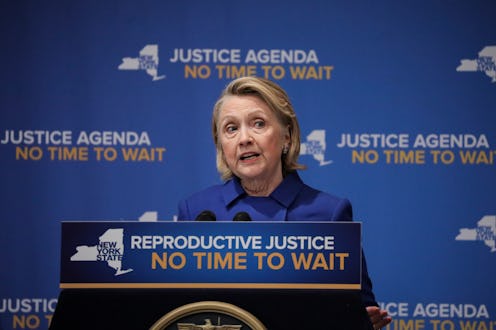
More often than not, "likability" tests haunt women in politics more than their male colleagues. Most recently, pundits wondered aloud if Massachusetts Democratic Sen. Elizabeth Warren, who announced that she was exploring a 2020 presidential bid in late December, was "likable" enough for American voters. Taking a swipe at such gendered criticism on Monday, Hillary Clinton weighed in on the "likability" issue that women leaders face.
The 2016 Democratic presidential nominee was joined by New York Democratic Gov. Andrew Cuomo at an event at Barnard College in Manhattan, New York. "There’s been a lot of talk recently whether our country is ready for women leaders and that really takes me back," Clinton said as the audience laughed. "Today, I want to thank all of you for your persistence."
"I know many of you and can attest as to how smart, determined, effective, and dare I say, likable you all are," Clinton added.
The "likability" factor often comes up whenever male politicians or media analysts discuss a female politician. And Clinton is no stranger to such public scrutiny; throughout her political career, she's been dubbed "polarizing," "disconnected," and "unlikable."
A recent Politico piece about Warren delved into whether she risked being bogged down by the "ghosts of Hillary," a reference to the Clinton's oft-analyzed public image. The piece got a lot of pushback, and two days after it went up, Warren retorted on Twitter, "I hear women candidates are most likable in the quiet car!"
Critics have spoken up against these kinds of tests supposedly meant to examine a female politician's charisma. On Sunday, MSNBC host Kasie Hunt lampooned pundits who questioned Warren's public image.
"Did anyone ever ask, oh say, Bernie Sanders that question in 2016?" a visibly annoyed Hunt said. "I remember that going a little differently. Some of his headlines: Washington Post's [article] 'Seven Ways Bernie Sanders Reminds Us Of Our Grumpy Grandpa,' New York Magazine's [article] 'How Did Bernie Sanders Turn Grumpiness Into Charm?'"
Hunt asked if people had scrutinized Beto O'Rourke, who ran an unsuccessful senatorial campaign against Texas Republican Sen. Ted Cruz in November, and whether he faced questions about how he "balanced" public and private responsibilities as a father of three.
Time and again, research has shown that people hold women politicians to a different set of standards than men while also questioning their leadership strengths. In 2016, The Pew Research Center observed that only 27 percent of the polled men said women were better at working out compromises compared to the 41 percent of women participants.
Additionally, only 22 percent of the polled male participants said that women leaders would improve American lives whereas 30 percent of the women in the study believed in the same idea.
Analysts have condemned the underlying misogyny that feeds such opinions. The vice president of the Center for American Progress think tank, Shilpa Phadke, told The Guardian on Friday, "Of course voter sexism and outright misogyny still exist. There’s a constant focus for women on what they’re wearing, what they look like, and the tone of their voice."
"It’s almost as if they’re not only running for president," Phadke told the publication, "but also running for Miss America." But as people push against the peculiar criterion, it remains unclear if the conversation around women leaders' "likability" will peter out.